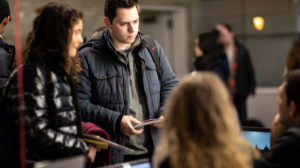You might be planning to go on a study abroad trip or maybe your program has already started and you’re already abroad right now. Either way, I’m so excited for you! Your study abroad will be a really memorable and unique experience. If you’re like me and it’s your first time on a study abroad experience, you probably have a lot of thoughts running through your mind. Between packing everything you need, booking your flights and accommodation, exchanging to your new country’s currency, and more – there’s a lot to think about and prepare!
You may have already looked up some of the best places to visit and things to do. You may have several restaurants on your list that you want to definitely try. Or maybe you’re open to spontaneity and making plans as you go! Indeed, you’ll be itching to see and do as many things as possible and take pictures to share with family and friends and post on Instagram. There are so many fellow study abroad students and locals to meet!
However, you don’t want to forget that it is a study abroad, so you will also be taking classes while you’re out of the country. Unlike a vacation, you will actually have to study and do classwork. This can be especially easy to forget if you’re abroad during summer 1 or summer 2 in a country with a warm climate!
But of course you don’t want to just spend all day studying in the library or coffee shop (As nice as they are and delicious as their food is! One of my favorite coffee shops to go while studying in Copenhagen was called Vintage Coffee). You also want to and should explore the new city or country you’re living in.
One of the challenges you might face while studying abroad is figuring out how to balance your studies with exploring, making memories, and having fun. Truthfully, it can be difficult, but it’s not impossible!
If you have these concerns before leaving for your study abroad trip or are currently facing this, then this article is for you!
Disclaimer: For the two classes I took at Copenhagen Business School during summer 2, my final grade for each class was dependent on just one exam that I’d take at the end of the 6 weeks of classes. There was no mandatory, graded homework or assignments; only the exam. This is typical of many universities in Scandanavian countries.
These tips can be helpful if you’re in a similar program or different!
Create a study time table/schedule
Take either a piece of paper or open Google Docs, Google Sheets, Excel, or any other digital platform where you can create a table (highly recommended) and create what looks like a calendar of all the days you’ll be abroad.
Now, take a look at your class syllabus and plan out your studies for the first week. Make a plan for specifically what you’ll do to prepare for your exams.
Here’s an example from one week of my study time table from Copenhagen:
Corporate Finance
| 7/18
-Read Ch 10 and take notes -Complete Excel exercises for Ch 10 |
7/19
-Review Quizlet flashcards for definitions and practice exam questions -Read Ch 11 and take notes |
7/20
-Read Ch 6 to prepare for class lecture; write questions to ask for clarification |
7/21
Study Day Off! *Make next week’s study plan! |
7/22
-Go over Ch 6 notes from class -Read Ch 7 to prepare for next class lecture; write questions to ask for clarification |
Pick a day at the end of the week (Saturday or Sunday) to write your plan for the new week ahead.
Actually try to stick to your time table
This part, admittedly, is much easier said than done. You really have to motivate yourself to stay on track. Set reminders on your phone. Pick a time of day when you are most focused. Make it part of your daily routine, even if it’s just an hour out of your day. As the exam gets closer, you’ll be thanking yourself because you’ll feel less stressed!
One thing I also included in my study plan as the exam got closer, was a count-down, which also motivated me to accomplish what was on the study time table for each day.
However, don’t beat yourself up if you miss a day or two, just try to get back on track by moving your plan around as needed. (I recommend doing the time table digitally because it’s easier to move things around!)
Healthy body = healthy mind
Exercising and eating healthy will help you be more focused in your classes and have more energy. This can also help to calm your nerves and lower your stress levels. The campus you’re studying at may have a gym, but if not, try and see if you can find one nearby. To save money, you could also go on jogs or runs.
In addition to eating and trying various food in the country you’re staying, here are some recommendations for ‘brain foods’- foods that can help you be more alert and can even boost your memory.
-blueberries
-almonds
-dark chocolate
-fish
Here’s a list of more foods.
Make study groups and connections in your classes
For both my classes here at CBS, my classmates and I have a group together where we ask questions, explain concepts, and share notes with each other. It’s really helpful to form such groups and collaborate together. This can be especially beneficial for classes that are more challenging!
Also, don’t be afraid to ask or email your professor with questions or clarifications you need. Even if they don’t have office hours, you can still go to them for help!
Have an accountability buddy
Similar to the advice above, it’s helpful to have the support of another person or other people. An accountability buddy can be someone from your class that you can trust to help keep you on track. You can do the same for them too! You’ll have their support and they’ll have yours.
I hope these tips are helpful and I wish you a wonderful time abroad!










